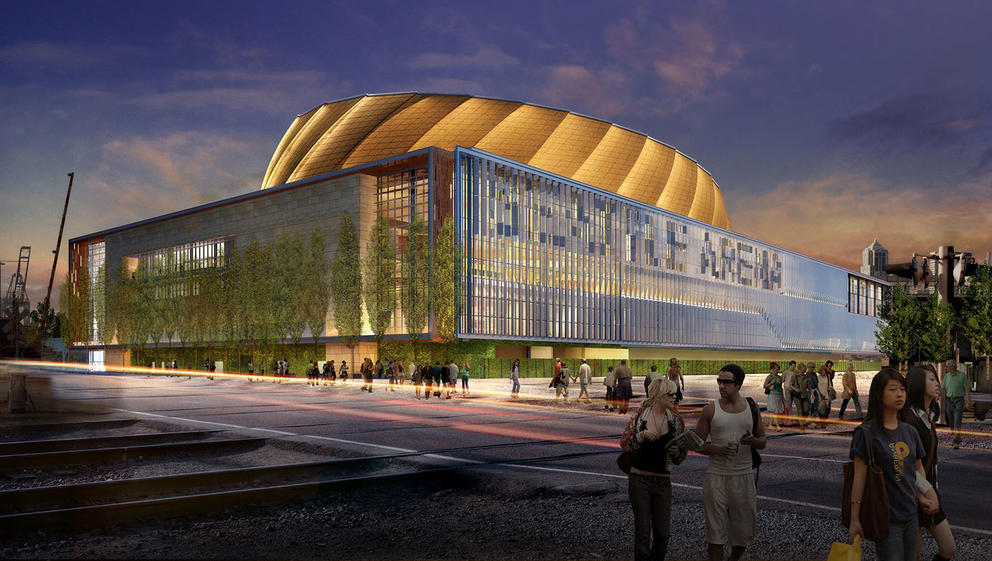Chris Hansen agreed Tuesday to do what liberal Seattle has wanted him to do for five years: agree to fund privately his $500 million proposed basketball/hockey arena in Sodo, which he hopes will return the NBA, eight years gone, to his hometown.
To further charm the City Council majority that spurned the project in May, the San Francisco hedge fund manager has agreed to kick in perhaps as much as $20 million to the proposed Lander Street Bridge project, long sought by the Port of Seattle, the arena's principal opponent.
Should the council, which by a 5-4 vote rejected the plan's trigger event, the vacation of two blocks of Occidental Street south of Safeco Field, consider and then approve the new deal, all he would need is to convince the NBA to grant Seattle a team.
Not exactly a trifle.
But if we have learned nothing else throughout this contretemps, we have learned that things change. But nothing will happen unless Hansen can assure the NBA that an arena will be built.
As laid out via letter to Mayor Ed Murray and King County Executive Dow Constantine, Hansen seeks to petition the Council for a re-hearing on the project, which originally sought a public contribution of up to $200 million — via the city's capacity to borrow money at cheaper rates — to help fund construction.
"We're trying to control the things (and) events we can control," said Wally Walker, a former Sonics player and team president who is a partner with Hansen and co-signed the letter. "Nothing can happen to acquire a team until the arena is approved. Somehow that was lost (in the council vote) when it was said that a team must come first. So we're going full speed ahead with what we can control."
The new proposal would end the current memorandum of understanding signed by the parties in 2012, and replace it with a new one. No term was mentioned in the letter, but what Hansen most needs now is time to secure a team. The original MOU expires in 13 months.
Since franchise relocation is increasingly unlikely -- nearly all NBA teams are making money, or nearing break-even, in current buildings -- Hansen's hope is based on expansion, which the NBA has steadfastly maintained was not on the horizon.
However, the NBA and the players union have been quietly negotiating a new collective bargaining agreement. Both sides want the deal, expected to include significant new revenues from broadcast and digital media, concluded by a December 15 deadline that would allow for an opt-out of the current bargaining agreement by either party.
When the deal is done, team owners will have firm revenue and expense numbers over the length of the deal that will tell them whether the 30-team revenue pie is large enough to cut in one or two more teams.
Hansen wants to be ready with an approved arena deal in hand.
After the council's narrow rejection, Hansen insisted the project was not dead. Walker said Hansen re-assessed the arena construction and operations budget and concluded that revenue projections for the Seattle market, which he once deemed too small to make an all-private building work, were now sufficient to avoid going through the briar patch of Seattle resentment of public subsidy for a private enterprise.
--
From Hansen's letter:
We have concluded that a changed economic climate makes possible the private financing of the arena. For that reason, and to address concerns expressed by city council members, we would consider revising the street vacation petition to eliminate public financing of the arena.
In such a case the MOU would be terminated and the rights and obligations of the parties under the MOU would end. The City and County would recoup the $200 million in debt capacity, and tax revenue streams generated by the arena would cease to be encumbered for arena debt service.
For our part, we have very few requests to make this possible:
- Approval of the street vacation
- Granting of a waiver of the City’s admissions tax for the arena, just as similar waivers have been granted for the other sports venues
- Adjustment of the City’s B&O tax rate for revenue generated out-of-town
We have identified other traffic and freight mobility improvements in SODO to which we will direct contributions. Further, we will agree, following street vacation approval, to commit the future payment of compensation for the vacated street to the City’s financing package for the Lander Street Overpass.
--
The Lander reference is for a project that would resolve a long-lamented choke point for trucks leaving the Port of Seattle. In July, the project secured $45 million in federal funding, bringing to $100 million the amount raised for the $140 million project that would take vehicle and pedestrian traffic up over nine sets of rail tracks, similar to the Edgar Martinez Drive flyover next to Safeco.
Hansen proposes to commit to Lander the market value purchase of the street, estimated in 2015 to be between $18 million to $20 million, to the bridge. The maneuver could exert pressure on the port to end its objection to the arena location.
Several council members cited the port's argument about potential job loss as a principal reason to vote no. But the job-loss issue also was an easier way to get out from under the subject, rather than to take on the public-financing issue that would inevitably involve litigation against the city for agreeing to the MOU.
Seattle environmental attorney Peter Goldman, who has led the fight against the arena location on behalf of the International Longshore and Warehouse Union, said that Hansen's new offer changes things, but that public financing wasn't the issue before the council in May.
"It's a new ballgame," he said, speaking as a citizen and not as a union representative. "I still think the opposition is about location. That's what the five council members said who voted no. They wanted to preserve middle-class wages and an industrial area. Did they not mean that?
"I also think the project's EIS (environmental impact statement) could be challenged as inadequate for not giving consideration to a number of factors. I'm not saying it will be challenged, but it could. And if Hansen gets council approval and gets a new MOU, it likely would be the death knell for KeyArena. Is that what the city wants?"
Until the letter, Hansen's only public statement since the vote was a post on his arena website saying his efforts were not done. Recently he and partners completed purchases of two parcels, including one that was part of his original Sodo plan, bringing his total Sodo property investment to $123 million, considerably more than the properties' assessed value.
Making the project private has been in public discussion for months, including a comment from council member Tim Burgess, who voted for the project in May. He said in September that an all-private project with would be "worth considering."
Tuesday evening, Port Commission president John Creighton sent a letter to the mayor and council reiterating its opposition to the arena location.
"During the Council street vacation debate, council members cited concerns over traffic, jobs and economic justice, noting that you can build an arena anywhere, but you cannot build a natural deep-water port," Creighton wrote. "Seattle’s working waterfront continues to lift tens of thousands of families into the middle class. It is the City’s responsibility to protect industrial lands like these through the Growth Management Act."
But Constantine, for one, cheered the development.
"Chris Hansen today demonstrated his continued commitment to building an arena, and to take advantage of an improving economy," he said in a statement. "His efforts will strengthen our ability to compete for an NBA team. We won't stop until we bring the Sonics home."
By removing his hand from the public till, did Hansen do enough to swing a single vote on the council? And if it does, will anyone at the NBA besides Portland Trail Blazers owner and Microsoft co-founder Paul Allen care?
Once believed dead after five years, the arena drama is clearly coming back to life.



